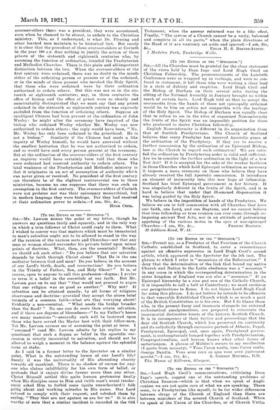(To THE EDITOR OP THE " SPECTATOR.") SIR,—All the Churches
must be grateful for the clear statement of the views held by Dean Inge and Lord Hugh Cecil on
Christian Fellowship. The pronouncements of the Lambeth Conference were so wrapped up in verbiage, and were so con- fused in statement, it left those who were waiting a clear lead in a state of dubiety and suspicion. Lord Hugh Cecil and the Bishop of Durham on their several sides during the sitting of the National Assembly in January brought us within reach of certain facts. Lord Hugh told us that to accept the sacraments from the hands of those not episcopally ordained would be to him an action not compatible with the leadings of the Holy Spirit. The Bishop of Durham was equally clear that to refuse to see in the rites of organized Nonconformity the fruits of the Spirit was an impossible position for those who professed to desire Christian fellowship.
English Nonconformity is different in its organization from that of Scottish Presbyterians. The Church of Scotland believes that every Presbyter has received Apostolic grace at the ordination of the Presbytery. If they are to receive a further commission by the ordination of an Episcopal Bishop, how is the Church to regard such ordination? We are satis-
fied the ordination by Presbyterian order is valid and sufficient. Are we to consider the further ordination in the.light of a flew
Test Act? If it is accepted for the sake of the weaker brethren in those Churches which hold Episcopal ordination as necessary it imposes a mere ceremony on those who believe they have already received the full Apostolic commission. It introduces an element of insincerity into this new hope of fellowship. Scotland has tried Episcopal government in her history. It was singularly deficient in the fruits of the Spirit, and it ia hard to believe that under that ill-omened dispensation it was being guided by the Holy Spirit.
We believe in the imposition of hands of the Presbyters. We believe we are in full communion with all Churches that have one faith, one Lord, and one Baptism, and we cannot believe that true fellowship or true reunion can ever come through re- imposing ancient Test Acts, nor in an attitude of patronizing apprising of the various motes in the eyes of non-episcopal


































 Previous page
Previous page